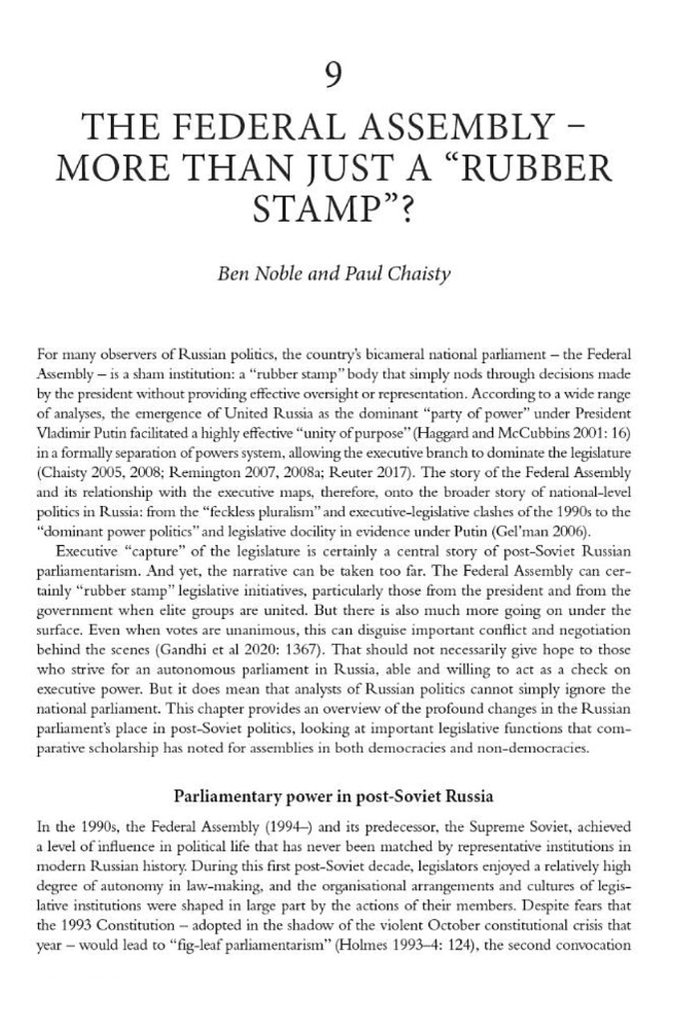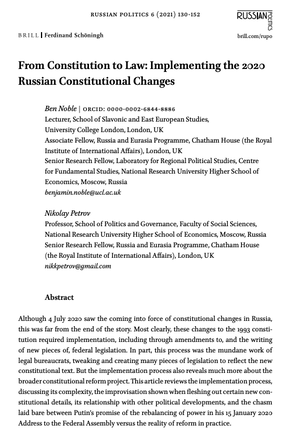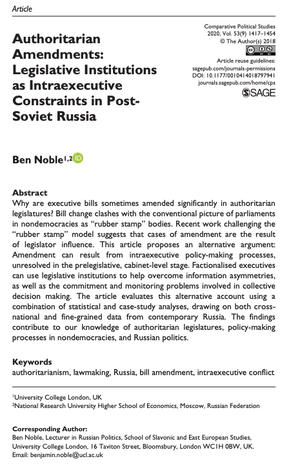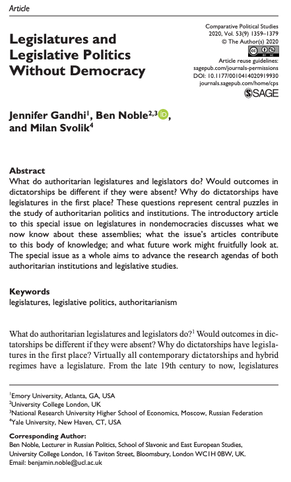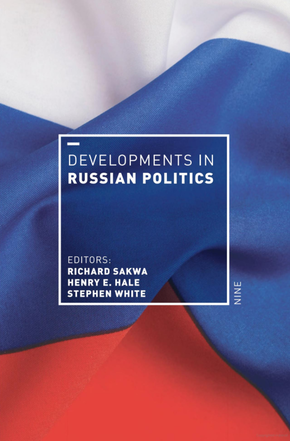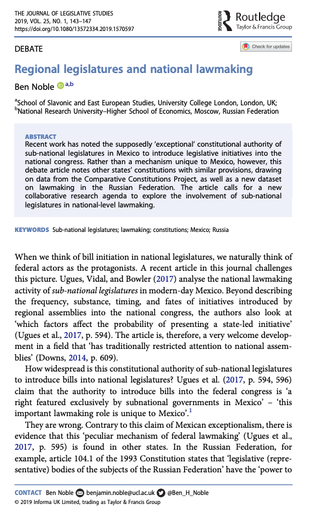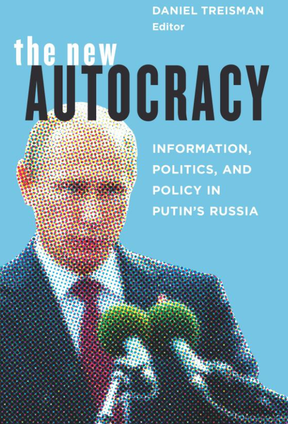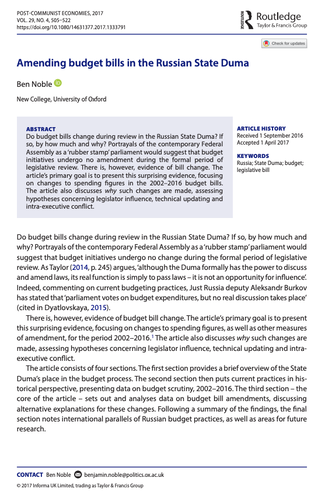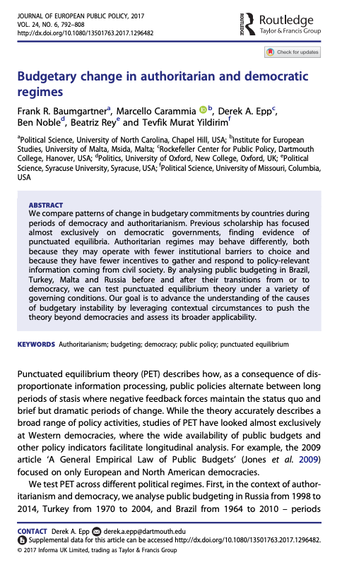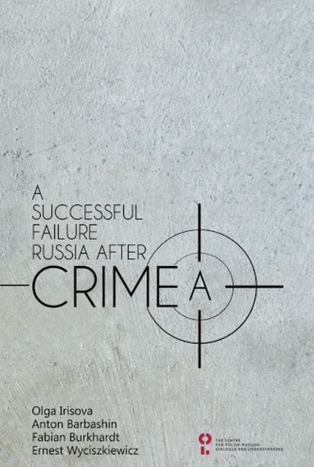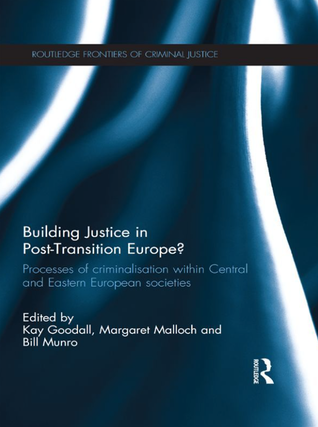If you would like a copy of any of the research publications listed below, please feel free to get in touch (benjamin.noble[at]ucl.ac.uk).
|
The Federal Assembly – More than Just a "Rubber Stamp"?. In G. Gill (ed.), Routledge Handbook of Russian Politics and Society (2nd edition). London; New York, NY: Routledge, 2023 (with Paul Chaisty).
|
|
From Constitution to Law: Implementing the 2020 Russian Constitutional Changes. Russian Politics, 2021 (with Nikolay Petrov).
Although 4 July 2020 saw the coming into force of constitutional changes in Russia, this was far from the end of the story. Most clearly, these changes to the 1993 constitution required implementation, including through amendments to, and the writing of new pieces of, federal legislation. In part, this process was the mundane work of legal bureaucrats, tweaking and creating many pieces of legislation to reflect the new constitutional text. But the implementation process also reveals much more about the broader constitutional reform project. This article reviews the implementation process, discussing its complexity, the improvisation shown when fleshing out certain new constitutional details, its relationship with other political developments, and the chasm laid bare between Putin’s promise of the rebalancing of power in his 15 January 2020 Address to the Federal Assembly versus the reality of reform in practice. |
|
Authoritarian Amendments: Legislative Institutions as Intra-Executive Constraints in Post-Soviet Russia. Comparative Political Studies, 2020.
Why are executive bills sometimes amended significantly in authoritarian legislatures? Bill change clashes with the conventional picture of parliaments in non-democracies as 'rubber stamp' bodies. Recent work challenging the 'rubber stamp' model suggests that cases of amendment are the result of legislator influence. This article proposes an alternative argument: amendment can result from intra-executive policy-making processes, unresolved in the pre-legislative, cabinet-level stage. Factionalised executives can use legislative institutions to help overcome information asymmetries, as well as the commitment and monitoring problems involved in collective decision-making. This article evaluates this alternative account using a combination of statistical and case-study analyses, drawing on both cross-national and fine-grained data from contemporary Russia. The findings contribute to our knowledge of authoritarian legislatures, policy-making processes in non-democracies, and Russian politics. |
|
Legislatures and Legislative Politics without Democracy. Comparative Political Studies, 2020 (with Jennifer Gandhi and Milan Svolik).
What do authoritarian legislatures and legislators do? Would outcomes in dictatorships be different if they were absent? Why do dictatorships have legislatures in the first place? Virtually all contemporary dictatorships and hybrid regimes have a legislature. From the late nineteenth century to the present, legislatures were present in 80 percent of dictatorships with a non-elected executive (Przeworski et al., 2013); all hybrid regimes – by definition – have a legislature. These questions, therefore, represent central puzzles in the study of authoritarian politics and institutions. Yet students of non-democratic regimes have only recently begun to employ the empirical methods and theoretical rigour typically seen in the study of democratic legislatures to the study of their non-democratic counterparts. Research on legislative politics, meanwhile, has addressed legislative politics under dictatorship only incidentally. The result is a disparity in our understanding of legislative politics in about one-half of the world’s regimes over the past century. This special issue aims to help correct this imbalance while advancing the research agendas of both authoritarian institutions and legislative studies. |
|
Parliamentary Politics in Russia. In R. Sakwa, H. Hale, and S. White (eds), Developments in Russian Politics 9. Basingstoke; New York, NY: Palgrave Macmillan, 2019.
In the early 1990s, parliamentary politics was at the heart of Russian politics. It was the deadlocked battle for supremacy between the Russian president, Boris Yeltsin, and the chairman of the Supreme Soviet, Ruslan Khasbulatov, that ended with the shelling of the White House – the-then seat of the Russian legislature. This violent confrontation ultimately claimed the lives of many in Moscow, with upper estimates reaching 1,000 people (see the chapter on contentious politics). Now, the Federal Assembly is dismissed as a mere ‘rubber stamp’ – a body that unthinkingly nods through decisions made by the Presidential Administration and the government. What changed? How did we get from violence to passivity, from parliament being at the centre of political life, to it (apparently) playing a largely peripheral, symbolic role? This chapter tells the story of federal-level parliamentary politics in post-Soviet Russia. |
|
Regional Legislatures and National Lawmaking. The Journal of Legislative Studies, 2019.
Recent work has noted the supposedly ‘exceptional’ constitutional authority of sub-national legislatures in Mexico to introduce legislative initiatives into the national congress. Rather than a mechanism unique to Mexico, however, this debate article notes other states’ constitutions with similar provisions, drawing on data from the Comparative Constitutions Project, as well as a new dataset on lawmaking in the Russian Federation. The article calls for a new collaborative research agenda to explore the involvement of sub-national legislatures in national-level lawmaking. |
|
Not Just a Rubber Stamp: Parliament and Lawmaking. In D. Treisman (ed.), The New Autocracy: Information, Politics, and Policy in Putin's Russia. Washington, DC: Brookings Institution Press, 2018 (with Ekaterina Schulmann).
This chapter analyses the place of the Russian Federal Assembly in modern-day Russian politics. [PDF] |
|
Amending Budget Bills in the Russian State Duma. Post-Communist Economies, 2017.
Do budget bills change during review in the Russian State Duma? If so, by how much and why? Portrayals of the contemporary Federal Assembly as a ‘rubber stamp’ parliament would suggest that budget initiatives undergo no amendment during the formal period of legislative review. There is, however, evidence of bill change. The article’s primary goal is to present this surprising evidence, focusing on changes to spending figures, 2002-2016. The article also discusses why such changes are made, assessing hypotheses concerning legislator influence, technical updating, and intra-executive conflict. |
|
Budgetary Change in Authoritarian and Democratic Regimes. Journal of European Public Policy, 2017 (with Frank Baumgartner, Marcello Carammia, Derek Epp, Beatriz Rey, and Tevfik Murat Yildrim).
We compare patterns of change in budgetary commitments by countries during periods of democracy and authoritarianism. Previous scholarship has focused almost exclusively on democratic governments, finding evidence of punctuated equilibria. Authoritarian regimes may behave differently, both because they may operate with fewer institutional barriers to choice and because they have fewer incentives to gather and respond to policy-relevant information coming from civil society. By analysing public budgeting in Brazil, Turkey, Malta, and Russia before and after their transitions from or to democracy, we can test punctuated equilibrium theory under a variety of governing conditions. Our goal is to advance the understanding of the causes of budgetary instability by leveraging contextual circumstances to push the theory beyond democracies and assess its broader applicability. |
|
The State Duma, the "Crimean Consensus," and Volodin's Reforms. In A. Barbashin, F. Burkhardt, O. Irisova, and E. Wyciszkiewicz (eds), Russia: Three Years After Crimea. Warsaw: The Centre for Polish-Russian Dialogue and Understanding, 2017.
This chapter surveys changes observed in the State Duma following the annexation of Crimea, as well as changes made by Vyacheslav Volodin since becoming speaker of the chamber. |
|
Decriminalising Sex Between Men in the Former Soviet Union, 1991-2003: Conditionality and the Council of Europe. In K. Goodall, M. Malloch, and B. Munro (eds), Building Justice in Post-Transition Europe? Processes of Criminalisation within Central and Eastern European Societies. Abingdon: Routledge, 2013.
Between 1991 and 2003, most former Soviet states decriminalised consensual sex between adult men. Only Uzbekistan and Turkmenistan retain articles in their criminal codes that criminalise this form of sexual congress. The cluster of progressive reforms was surprising, not least because the morally sensitive changes were largely uncontested. Commenting on the possibility of decriminalisation, Igor Kon – the leading Russian academic on sexual minorities – wrote in 1993 (112): ‘Even given a favourable outcome, the process is bound to be protracted, problematical and vastly different in the various regions and former republics’. This scenario, however, was not realised. This chapter explores this group of decriminalisations, interrogating the existing view that legal reform was primarily the result of Council of Europe membership conditionality. [PDF] |
